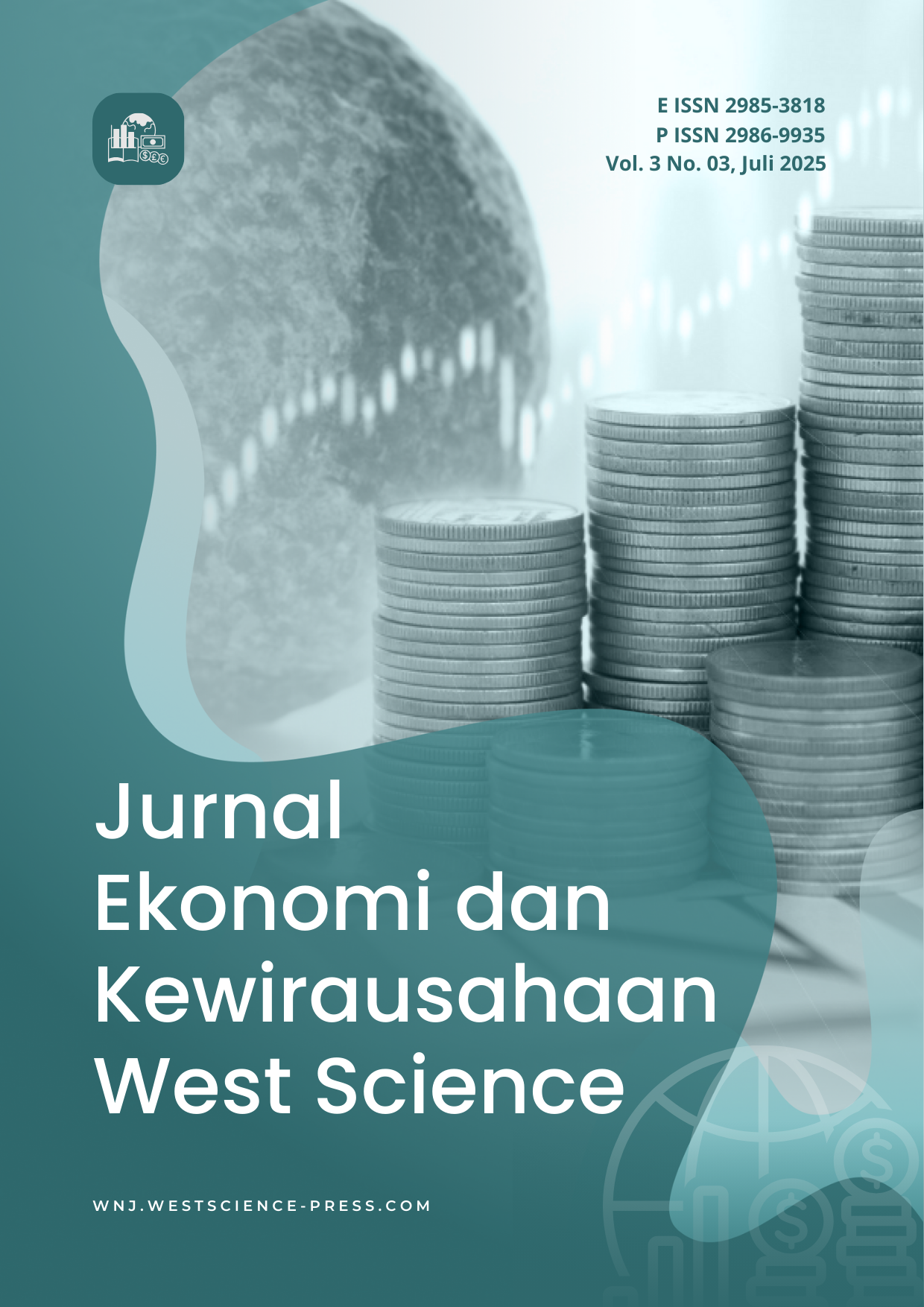Lanskap Penelitian Akuntansi Digital: Tinjauan Bibliometrik 2000–2024
DOI:
https://doi.org/10.58812/jekws.v3i03.2476Kata Kunci:
Akuntansi Digital, Bibliometrik, Artificial Intelligence, Blockchain, VOSviewerAbstrak
Studi ini bertujuan untuk memetakan lanskap penelitian akuntansi digital secara komprehensif selama periode 2000–2024 dengan menggunakan pendekatan bibliometrik. Data dikumpulkan dari basis data Scopus dan dianalisis menggunakan perangkat lunak VOSviewer untuk mengidentifikasi tren kata kunci, kepadatan tematik, evolusi temporal, kolaborasi penulis, serta jejaring antarnegara. Hasil analisis menunjukkan bahwa topik seperti artificial intelligence, blockchain, dan information systems menjadi pusat perhatian utama dalam literatur akuntansi digital. Visualisasi temporal memperlihatkan pergeseran fokus dari pelaporan keuangan konvensional menuju teknologi disruptif dan tema keberlanjutan. Selain itu, peta kolaborasi penulis dan negara mengungkapkan struktur jaringan ilmiah yang terklaster, dengan dominasi aktor-aktor seperti Amerika Serikat, Malaysia, Jordan, dan Indonesia. Studi ini juga menemukan adanya celah penelitian yang masih terbuka pada tema smart contracts, SMEs, dan etika digital. Temuan ini diharapkan dapat menjadi landasan bagi pengembangan agenda riset masa depan dan memperkuat kerja sama ilmiah global di bidang akuntansi digital.
Referensi
Afifa, M. M. A., Van, H. V., & Van, T. L. H. (2022). Blockchain adoption in accounting by an extended UTAUT model: empirical evidence from an emerging economy. Journal of Financial Reporting and Accounting, 21(1), 5–44.
Al-Okaily, M. (2024). Assessing the effectiveness of accounting information systems in the era of COVID-19 pandemic. VINE Journal of Information and Knowledge Management Systems, 54(1), 157–175.
Al-Okaily, M., Al-Majali, D., Al-Okaily, A., & Majali, T. (2023). Blockchain technology and its applications in digital accounting systems: insights from Jordanian context. Journal of Financial Reporting and Accounting, ahead-of-print.
Al-Okaily, M., Alghazzawi, R., Alkhwaldi, A. F., & Al-Okaily, A. (2022). The effect of digital accounting systems on the decision-making quality in the banking industry sector: a mediated-moderated model. Global Knowledge, Memory and Communication, 72(8/9), 882–901.
Al-Okaily, M., Alsmadi, A. A., Alrawashdeh, N., Al-Okaily, A., Oroud, Y., & Al-Gasaymeh, A. S. (2023). The role of digital accounting transformation in the banking industry sector: an integrated model. Journal of Financial Reporting and Accounting, 22(2), 308–326.
Ali, M., Rasyid, A. R., Arifin, M., Akil, A., Wunas, S., Natalia, V. V., Osman, W. W., Ekawati, S. A., Patandianan, M. V., & Sastrawati, I. (2024). Sosialisasi Strategi Kebijakan Perencanaan Wisata Pesisir Berkelanjutan Tanjung Bira dan Lemo-lemo di Dinas Pariwisata, Pemuda dan Olahraga Kab. Bulukumba. JURNAL TEPAT: Teknologi Terapan Untuk Pengabdian Masyarakat, 7(2), 390–397.
Chiu, V., Liu, Q., Muehlmann, B., & Baldwin, A. A. (2019). A bibliometric analysis of accounting information systems journals and their emerging technologies contributions. International Journal of Accounting Information Systems, 32, 24–43.
Donthu, N., Kumar, S., Mukherjee, D., Pandey, N., & Lim, W. M. (2021). How to conduct a bibliometric analysis: An overview and guidelines. Journal of Business Research, 133, 285–296.
Fisher, I. E., Garnsey, M. R., Goel, S., & Tam, K. (2010). The role of text analytics and information retrieval in the accounting domain. Journal of Emerging Technologies in Accounting, 7(1), 1–24.
Haddouche, H., & Salomone, C. (2018). Generation Z and the tourist experience: tourist stories and use of social networks. Journal of Tourism Futures, 4(1), 69–79.
Kruskopf, S., Lobbas, C., Meinander, H., Söderling, K., Martikainen, M., & Lehner, O. (2020). Digital accounting and the human factor: theory and practice. ACRN Journal of Finance and Risk Perspectives.
Leitner-Hanetseder, S., Lehner, O. M., Eisl, C., & Forstenlechner, C. (2021). A profession in transition: actors, tasks and roles in AI-based accounting. Journal of Applied Accounting Research, 22(3), 539–556.
Lutfi, A., Alkelani, S. N., Al-Khasawneh, M. A., Alshira’h, A. F., Alshirah, M. H., Almaiah, M. A., Alrawad, M., Alsyouf, A., Saad, M., & Ibrahim, N. (2022). Influence of digital accounting system usage on SMEs performance: The moderating effect of COVID-19. Sustainability, 14(22), 15048.
Nowacki, M., Kowalczyk-Anioł, J., & Chawla, Y. (2023). Gen Z’s attitude towards green image destinations, green tourism and behavioural intention regarding green holiday destination choice: A study in Poland and India. Sustainability, 15(10), 7860.
Pramudya, W., & Hidayat, S. (2024). Persepsi wisatawan terhadap dampak pengembangan pariwisata berkelanjutan di Desa Wisata Nglanggeran, Kabupaten Gunungkidul. Indonesian Journal of Tourism Business and Entrepreneurship, 1(1), 55–70.
Prayag, G., Aquino, R. S., Hall, C. M., Chen, N., & Fieger, P. (2025). Is Gen Z really that different? Environmental attitudes, travel behaviours and sustainability practices of international tourists to Canterbury, New Zealand. Journal of Sustainable Tourism, 33(6), 1016–1037.
Salinero, Y., Prayag, G., Gómez-Rico, M., & Molina-Collado, A. (2025). Generation Z and pro-sustainable tourism behaviors: Internal and external drivers. Journal of Sustainable Tourism, 33(6), 1059–1078.
Seyfi, S., Hall, C. M., Vo-Thanh, T., & Zaman, M. (2023). How does digital media engagement influence sustainability-driven political consumerism among Gen Z tourists? Journal of Sustainable Tourism, 31(11), 2441–2459.
Seyfi, S., Sharifi-Tehrani, M., Hall, C. M., & Vo-Thanh, T. (2025). Exploring the drivers of Gen Z tourists’ buycott behaviour: A lifestyle politics perspective. Journal of Sustainable Tourism, 33(6), 1146–1164.
Unduhan
Dimensions
Diterbitkan
Terbitan
Bagian
Lisensi
Hak Cipta (c) 2025 Loso Judijanto

Artikel ini berlisensiCreative Commons Attribution-ShareAlike 4.0 International License.






















 Instagram
Instagram 